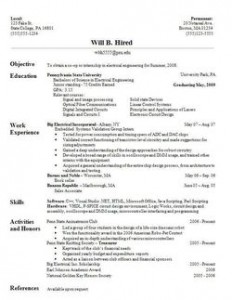This article is written and submitted by Caroline Ross a writer for accreditedonlineuniversities.com.
Getting a job is difficult enough as it is. When you don’t have the necessary work experience to get the kinds of jobs you want, it is even more difficult. The problem is that many of us look at a job ad and know that we could fill that role in a second and do it well, but we are not technically experienced. We may not have two years in a specific field or the right degree. But, there are many ways to demonstrate to employers that we are experienced in other ways. If you have more life experience than work experience, here are some ways you can include it in your resume:
1. Academic Projects
If you have a degree, you probably have much more professional experience than you think. Try to think about all the extracurricular activities you were involved in. Did you head up a publication or serve as a leader in a sports team? Did you do any independent projects or research? Were you selected by your professors or the administration to perform any responsibilities outside of your normal coursework? All these activities demonstrate leadership and the ability to work with a team. They also demonstrate the ability to juggle multiple tasks. It’s perfectly okay to put an “Academic Projects” or “Academic Experience” section in your resume.
2. Volunteer/No compensation Experience
If there is anything that you have done outside of school in the course of your life that was basically like a job, except you didn’t get paid, then this most definitely applies to your resume and all-around experience. Make sure to list any positions you may have held in any kind of organization. If there was no central organization involved, give an account of the different ways you volunteered your time, such as watching your neighbor’s children three times a week because she needed to get to work. This type of experience shows that you care about others and can be depended upon to help.
3. Personal History
If you have a personal history that has made it difficult for you to work towards a degree or get a job, then there is no reason not to include that on your resume in some way. You can add a section entitles “Personal Experience” or “Personal History.” If you have suffered any hardships that have made you a much stronger person now, then including that on a resume can really bring some life and character into it.
4. Independent Learning
There are many ways we learn that do not necessarily earn college credits. But, if you don’t include everything you’ve learned in your resume, then future employers have no way to know who you really are. If you’ve taken a photography class with a master, if you’ve taken free online courses, or if you learned how to fix your own car and now fix the cars of all your friends, you can potentially put all of this in your resume under an “Independent Learning” section.
Author’s Bio: Caroline Ross is a writer for www.accreditedonlineuniversities.com. She is passionate about global education, distance learning and finding the right career path in a modern world. Please leave comments below!









